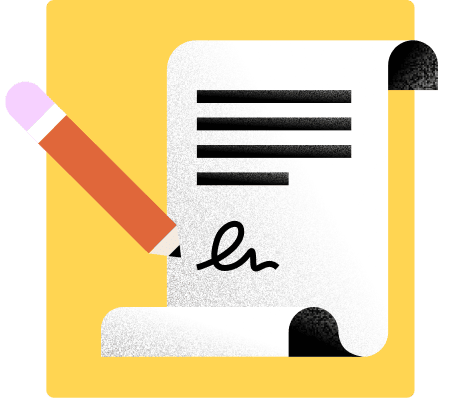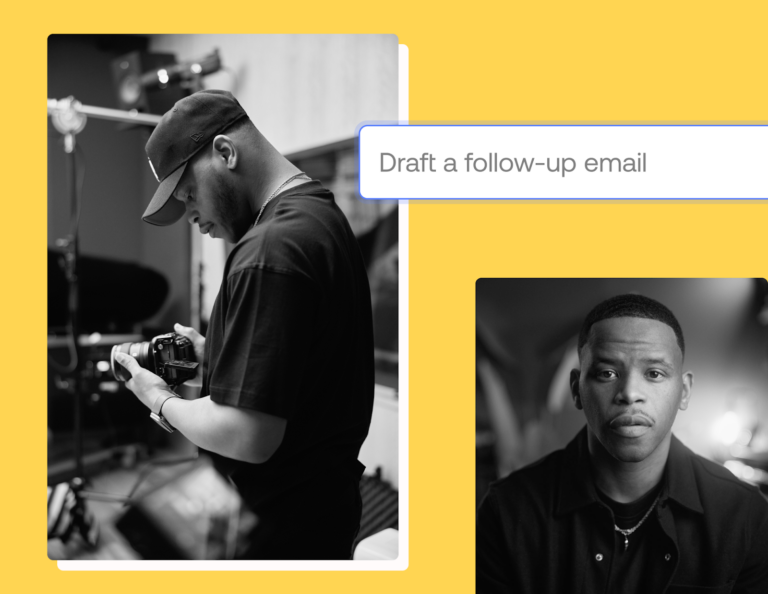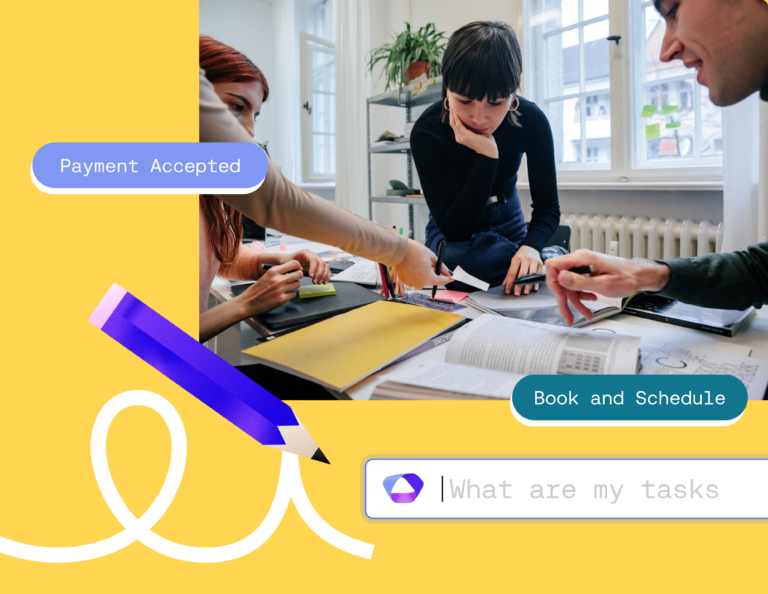Learn how tech solutions can simplify email management by providing templates, automation features, and an all-in-one client communication management.

Whether you’re in photography, design, consulting, or coaching, crafting the perfect balance between professionalism and friendliness in your reminder emails can make all the difference when it comes to excellent client relationship management. Reminding your clients with professionalism and kindness will encourage timely responses and payments.
Here we guide you through various types of reminders, such as meeting reminder emails or payment reminders, while providing useful tips for each scenario. Learn how to craft a gentle yet effective nudge that keeps both upcoming meetings and cash flow on track without compromising delivering a remarkable client experience. With these best practices under your belt, along with HoneyBook’s streamlined platform designed specifically for independents like yourself, managing your clientflow has never been easier.
Jump to:
- Common types of reminder emails for independent businesses
- Best practices for writing friendly yet effective reminder emails
- Gentle and polite payment reminders: Choosing the right tone
- Leveraging technology and tools for effective reminder emails
- Finding all-in-one solutions for client communication management

So we’ve compiled an email template for every type of correspondence.

Common types of reminder emails for independent businesses
Common types of reminder emails each serve a different purpose but share the same goal: to prompt clients or collaborators to take timely action without being pushy or overly aggressive.
Meeting reminders
Meeting reminders serve as gentle nudges to ensure your clients remember upcoming appointments, calls, consultations, or sessions in spite of their busy schedules. They help avoid miscommunication and last-minute cancellations while also demonstrating your commitment to punctuality and professionalism.
Here are some key elements you should include in meeting reminder emails:
- A clear subject line highlighting the purpose
- A personalized greeting addressing your client by name
- Date, time, and location (physical address/online link) information for easy reference
- A brief overview/reiteration of what will be discussed during the meeting (goals/agenda items)
- A clear call to action if any meeting prep is required
Payment reminders
Payment reminder emails are essential for maintaining healthy cash flow and keeping your business on track. They serve as polite reminders for clients to settle outstanding invoices or bills promptly, reducing the risk of late payments or disputes.
Strategies for crafting effective payment reminder emails include:
- Using clear and concise subject lines (e.g., “Friendly Reminder: Invoice #123 Due Today”)
- Addressing your client by name to personalize the message
- Providing invoice details such as the amount due, invoice number, and due date
- Attaching a copy of the invoice or including a direct link to an online payment system (HoneyBook can streamline this process)
- Offering multiple convenient payment options if possible
- Expressing gratitude for the recipient’s business while remaining professional
Follow-ups about no response to previous emails
Sometimes, clients may overlook previous communications in their busy inboxes. Follow-up reminder emails, though, gently prompt them to respond.
Timing is crucial when sending these reminders. Wait an appropriate period after initial contact before following up — usually three to five days depending on the level of urgency.
Key aspects of follow-up email reminders:
- A polite tone acknowledging they might have missed earlier messages
- A clear reference back to the original email discussed
- A brief summary highlighting why a response is needed
Reminder to sign a contract
Independent businesses rely heavily on contracts and agreements defining project scope, terms, payment schedules, and other important information. It’s vital that both parties sign promptly, and that all expectations are aligned from day one.
Strategies for writing a reminder email about contract signing:
- Briefly reiterate how signing will benefit both parties
- Include direct links/access instructions, making it easy and simple to take action immediately
Try automated payment reminders
Plug your payment reminder email into HoneyBook for automated reminders that get you paid on time.
Other reminder emails
In addition to the common reminder emails discussed above, a few more types may be relevant for independent businesses:
- Project milestone reminders: These emails remind clients about approaching project milestones and deadlines, ensuring everyone stays on track and necessary actions are taken in a timely manner.
- Event or webinar reminders: Businesses hosting events can send out event reminders to help increase attendance. Use these to keep the date fresh in attendees’ minds while also providing any updates on event details (e.g., new speakers or agenda changes).
- Subscription renewal and/or payment reminders: If your business offers subscription-based services such as coaching programs, send renewal reminders before subscriptions expire to encourage ongoing engagement and retain customers.
- Appointment rescheduling/cancellation notices: Sometimes, appointments need rescheduling due to unforeseen circumstances. Ideally, these notices inform clients of changes while offering alternative scheduling options so they can plan accordingly.
Each of these additional email types plays an important role in maintaining clear communication with your clients while promoting smooth business operations across various scenarios.
Best practices for writing friendly yet effective reminder emails
Follow these best practices when crafting reminder emails to significantly increase their effectiveness.
- Subject lines that grab attention: Write clear and concise subject lines indicating the email’s purpose. For meeting reminder emails, include the time and date. For payment reminders, specify the invoice number and due date.
- Personalizing your message: Address clients by name to make the communication feel more personal and foster better connections with your clientele.
- Maintaining politeness and positivity: Use polite language like “please” or “kindly,” and avoid aggressive tones. Express gratitude for the recipient’s continued support or cooperation in resolving matters at hand effectively.
- Clarifying the purpose of the email: Clearly state why you’re sending a gentle reminder email, whether it’s about an upcoming meeting or an outstanding payment due soon. Minimize confusion and prompt action from recipients.
- Providing clear instructions/calls to action: Offer specific steps or links needed to complete tasks: e.g., here’s a link to sign your contract online through HoneyBook’s platform. Ensure actions are simple and straightforward so clients don’t face obstacles when completing them.
- Incorporate deadlines and time-sensitive information: Include timelines or deadlines to emphasize urgency without being pushy. Payment-specific reminders, for instance, should clearly outline when payments are expected.
- Offering support and assistance if needed: Show willingness to answer questions or address concerns that may arise during the completion of requested tasks or actions (e.g., “If you have any questions regarding the contract, please don’t hesitate to reach out.”)
By implementing these best practices for writing friendly yet effective gentle reminder emails, you’ll be better equipped to facilitate smooth transactions and maintain strong relationships with clients. With the help of HoneyBook’s all-in-one clientflow management platform, crafting and sending these polished communications becomes even more effortless — allowing you to focus on delivering remarkable service experiences.
Pro tip
Leverage the power of personal stories or anecdotes to create a stronger connection with your clients while still maintaining a professional tone in your emails. E.g., when sending out meeting reminders, you could share an experience where collaboration led to exceptional results.
Gentle and polite payment reminders: Choosing the right tone
Always employ nuance when selecting the tone of your email. Choosing the right one for your reminder emails is key to maintaining strong client relationships.
For starters, understand when to use gentle, polite, or payment-specific language:
- Gentle reminders are suitable for situations where there’s no immediate deadline (e.g., reminding clients about an upcoming meeting).
- Polite reminder emails convey urgency without being aggressive; these are ideal when waiting on a response that’s past due.
- Payment-specific reminders focus on outstanding invoices and should balance professionalism with friendliness to encourage prompt payment.
You should also modify tone based on your relationship with the recipient:
- For long-term clients and those you’ve built rapport with, a more casual approach might be appropriate.
- With newer clients or in formal business settings, maintain politeness and adhere to standard professional email etiquette.
Pro tip
Ultimately, choosing the right tone depends on understanding your audience. Craft each reminder thoughtfully, considering both context and the relationship dynamics in mind.
Leveraging technology and tools for effective reminder emails
Incorporating technology in your reminder email process can streamline tasks, increase efficiency, and enhance client experiences.
Customizable reminder email templates that are available on various platforms allow you to maintain consistency while tailoring reminders to specific situations like meeting or payment reminders. Streamlined scheduling, invoicing, and project tracking processes, meanwhile, give your client the best experience with a seamless clientflow.
You can also set up automated emails for meeting reminders based on scheduled appointments or deadlines: for example, by using HoneyBook’s built-in functionality. Targeted follow-up campaigns after initial communications also help ensure important messages don’t get lost in the inbox shuffle.
Embracing tech solutions ensures that your professional yet friendly reminders reach clients while simplifying administrative tasks for you as a business owner. Solutions like HoneyBook not only provide a powerful platform to manage client communications but also offer built-in features for customizable templates and automation.
RELATED POST
Finding all-in-one solutions for client communication management
With the tips and best practices shared in this article, you’re now well-equipped to craft professional and friendly reminder emails that promote positive client experiences. To further enhance your efficiency, consider using HoneyBook — a one-stop platform for managing client communication, scheduling, and payments. It’s an all-in-one tool for client communication. Plug your templates into reminder emails to send effective reminders so you can focus on delivering your services.
Automate emails reminders and much more
HoneyBook’s customizable email templates allow you to create polished reminders while automated features streamline the process.




